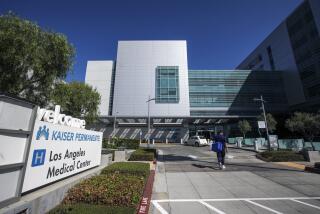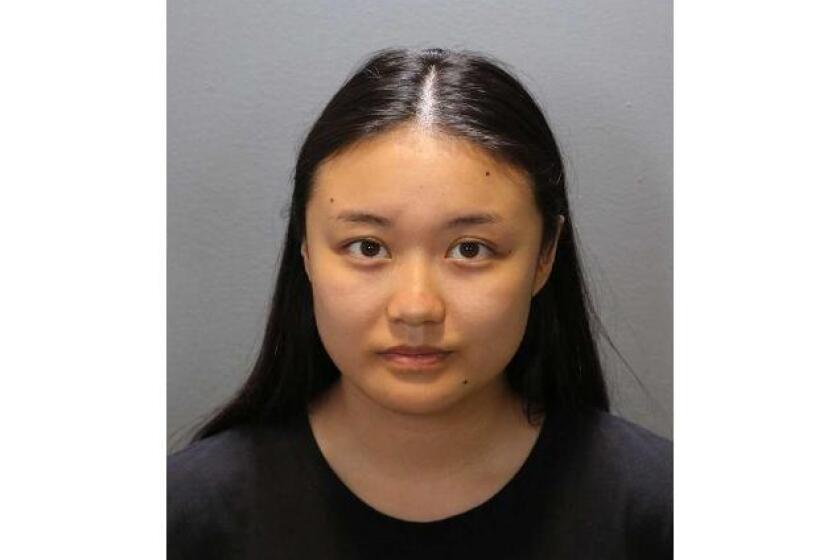Can’t forgiveness transcend death?
The mourners were outnumbered by news crews and clerics at this week’s burial service at the Los Angeles County Crematory. I’m not sure what group to count myself in. I took notes, and I prayed.
And I mourned for those who had died alone, as I contemplated the freshly dug mass grave that had become their final home. It held the remains of 1,689 people who died in Los Angeles County three years ago and were cremated by the county after no one showed up to claim their bodies. Three years later, their ashes were still unclaimed. It was time for the county to bury them.
Every year, for more than 50 years, the county has ceremoniously interred its unclaimed in the crematorium’s tiny graveyard, on the small slope of a grassy hill alongside Evergreen Cemetery in Boyle Heights.
At Wednesday’s memorial, Christian, Muslim, Jewish and Buddhist prayers were offered. Onlookers were given flowers to scatter. There were no personal stories shared, no individual tragedies mourned. But Father Chris Ponnet’s thoughtful eulogy cloaked the anonymous dead in dignity.
Ponnet is director of spiritual care at Los Angeles County-USC Medical Center. He considers this official ritual a reflection of the county’s reverence for humanity. “It’s a sign that society does not throw away people who die, for various reasons, alone,” he said.
It is also a reminder of life’s fragility. And a symbol of something less ennobling: Our fraying social fabric and unforgiving economy.
--
As chief investigator for the coroner’s office, Craig Harvey tries to track down friends and family members of people whose bodies linger at the morgue unclaimed. That sometimes sends him wading into family feuds, trying to reconnect relatives who gave up on one another long ago.
“Sometimes we find them and they want the ashes,” he said, recalling a young woman who was “thrilled” to take possession of her grandfather’s remains. An aunt had been trying to hold the ashes hostage because of some ancient disagreement, he said.
But sometimes “there’s so much animosity, they just walk away. They’ll say ‘How did you find me? I haven’t talked to my brother in 30 years.’ They’re not interested in taking responsibility now.”
Other times the impediment is more mundane; it costs about $400 to retrieve the remains of someone cremated by the county. “They may be living on Social Security themselves,” Harvey explained. “They’ve got no money to claim this person.”
Cemetery caretaker Albert Gaskin supervises the cremations — “gets the paperwork done,” he said. “We do about six a day … each person cremated individually.” Their ashes are packed in plastic bags, stored in reusable plastic urns the size of a cigar box.
This week, Gaskin helped stack those bags in a 7-foot-square hole, dug 7 feet deep. By the time the service began, the mound of dirt covering the plot was crowned with a modest spray of white flowers. Later a plaque the size of an index card, plain except for the burial year, will be added to mark the spot.
Martha Vega was among a half-dozen visitors, there to “show my respect,” she said. She had tended some of the dead as a county hospital chaplain. Some had battled long illnesses; others died unexpectedly from traumatic injuries, she said.
“Many of these people, we were present at their death, accompanied them in their final hour.” She saw the “spectrum of feelings” among those preparing to face life’s end alone. “Some are still angry about whatever broke up their family. They really don’t care to have a connection. And some are sad and wish they had a family.”
I spoke with a pair of outreach workers from Passageways, a Pasadena agency that helps homeless people. “This is not what you think; not some body just abandoned on the street,” Ruben Gallegos told me. “Almost all of these people have families.”
Some of their clients wound up among the unclaimed dead; most were mentally ill or addicted to drugs or alcohol. They’d broken with their families years ago, been given up on and written off. “They go unclaimed for two reasons,” Gallegos told me: “Animosity and finances.”
His partner, Kitty Galt, added another: “Our transient society.”
People leave their home towns, move around, lose touch and never nurture the kind of roots that might make their ashes important to someone.
--
I cannot imagine dying alone or envision a violation thicker than blood — a dispute so ugly and long-lasting that it would obliterate my ties to my family.
As we walked the burial ground, Ponnet told me that every year, a few people discover too late that someone they loved is buried there.
Some visit the cemetery and add to the mass graves small personal markers. Many are terse and plain, bearing only dates of birth and death and the deceased’s name. But others hint at tenderness, reminding me that these graves hold not just “unclaimed dead” but a “beloved brother,” someone’s “husband and father,” a handsome teenage son whose parents apparently cared enough to add his photo to the small square marker.
I see evidence of recent tending: a fragrant bouquet on a 10-year-old grave, a shiny ceramic statue of the Virgin Mary, a polished granite headstone marking the 1989 death of a 14-year-old “daughter, sister and auntie.”
None of the markers offered hints to whatever feud or misfortune landed them there. How, I wondered, could teenagers like Bryant Hernandez and Cassandra Belton die alone, unaccounted for for years, until loved ones marked their burial sites?
I thought about them when I heard later that day of Elizabeth Edwards’ death, surrounded by friends and family members. Among them was her estranged husband, John Edwards, whose scandalous infidelity had compounded the pain of her struggle with cancer.
She must have looked past her husband’s betrayal to remember the man she’d once called her “rock” — the husband who weathered tragedy alongside her, the father of three children who will ever mourn her.
Impending death, it seems, can recalibrate pain and reconfigure our memories.
Those crowded graves can be seen as an ugly testimony to the enduring power of anger, bitterness and neglect. But they are also a reminder of the possibility life offers. It is not too late to reach out, to forgive, to restore a relationship, until you—or someone you love—has passed away.
The Los Angeles County Coroner’s database of unclaimed bodies includes more than 5,000 names.
More to Read
Start your day right
Sign up for Essential California for news, features and recommendations from the L.A. Times and beyond in your inbox six days a week.
You may occasionally receive promotional content from the Los Angeles Times.






